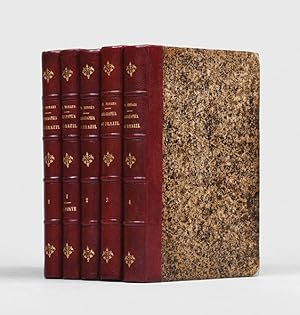Beschreibung
First edition of this encyclopaedic work on the political, economic, and social history of Brazil from the 15th to the mid-19th century, written by the Brazilian physician and autodidact historian Alexandre José de Mello Moraes. Uncommon in commerce with only two incomplete sets appearing at auction; it is rarely seen complete due to its slightly complex publication history. The set published issued by two different houses over a period of five years. Volumes I and II were published by Soares de Pinho, and volumes III, IV, and volume I (part II) were published by J. J. Patrocino. A second edition of the work was issued in 1866-8. Born in the Brazilian state of Alaoas, Mello Moraes (1816 1882), was orphaned at an early age and taken in by two uncles, both of them in religious orders. Despite his early adversities, Moraes qualified as a medical doctor in 1840. He began his career as an allopathic practitioner in Bahia, later becoming an early promoter of homeopathic medicine, and president of the Instituto Homaeopatico do Brazil. Although not a trained historian, he meticulously collected historically valuable documents and manuscripts towards the compilation of the present publication. In addition to this, Mello Moraes wrote more than 45 books, pamphlets, and dictionaries covering history, literature, medicine, and homeopathy. His other notable works include O Brazil historico ("Historic Brazil"), 1864; A independencia e imperio do Brazil ("The independence and Empire of Brazil"), 1877; Phitographia ou botanica brasileira, applicada á medicina, ás artes e á industria ("Phytographia or Brazilian Botany, Applied to Medicine, Arts, and Industry"), 1878. Mello Moraes immersed himself in politics representing his home province from 1869 to 1872. He aligned himself with the opposition to Pedro II's government. In 1865, he wrote that "it would truly be a national day, if the country's government, true to the oath that it took, kept in mind that the constitution that governs us, the best constitution that we know of, is like the Ark of the Tabernacle, which no one could touch without falling dead" (Kraay, p. 250). The renowned Portuguese bibliographer, Inocêncio Francisco da Silva elaborates on the impact that Mello Moraes's strained relationship with the government had on the present publication: "The author was forced to suspend the production of this work … since the proceeds from the sale were not enough to cover even half of the printing expenses. In a recently published pamphlet entitled A Posteridade he expands on his grievances more heartily, complaining about the lack of assistance given by the government to such an important publication. The lack of assistance becomes more curious as the legislative chambers decreed that the same government would order a thousand copies of the Corographia to help with the printing expenses, an order that was never to be carried out" (Francisco da Silva, p. 37). His son Alexandre José de Mello Moraes Filho (1844-1919), was similarly a physician and historiographer, and was importantly one of the first chroniclers of life of the Cariocas, the common people of Rio de Janeiro life. Mello Moraes Filho was also a fierce abolitionist, who denounced the "iniquity of slavery past and present, Indian and African" (Treece, p. 238). His magnum opus, the Patria Selvagem ("Savage Fatherland"), revises the traditional Imperial foundation myth "in order accommodate the forgotten facts of Indian slavery and thereby denounce the legacy of social injustice that underpinned [the] Empire" (ibid.). Provenance: With the bookplate of Eugénio Eduardo de Andrea da Cunha e Freitas, on verso of front free endpaper of volume I. Freitas (1912-2000) was a prominent Portuguese lawyer, historian, and genealogist, who wrote more than 400 academic articles and books, and contributed to the Grande Enciclopédia Portuguesa e Brasileira. A leaf of neat notes, possibly by Freitas, is pasted in at the end of volume III. Additionally.
Bestandsnummer des Verkäufers 156764
Verkäufer kontaktieren
Diesen Artikel melden




